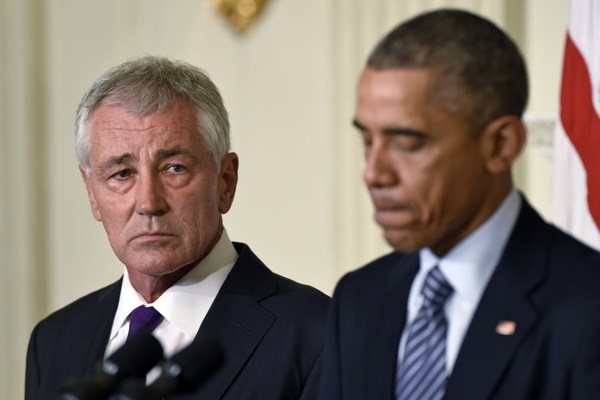U.S. Secretary of Defense Chuck Hagel apparently drew the short straw and emerged as the first sacrificial victim dispatched by President Barack Obama in response to his party’s dismal midterm election results, which will cost the Democrats control of the Senate. Beyond that, however, it is clear that the focus of U.S. national security has shifted dramatically over the past two years. Hagel was selected to preside over the American disengagement from the Middle East, to usher through a series of lean budgetary years for the Pentagon and to lay the foundations for the eventual rebalance of American strategic priorities toward the Asia-Pacific region. But to paraphrase Michael Corleone from “The Godfather,” Obama now finds himself in need of a wartime consigliere—one who can pivot from long-term planning to short-term fire-fighting against the so-called Islamic State (IS), the Ebola outbreak in West Africa and the Russian incursion into Ukraine, among other crises.
So far, several of the potential candidates on the short list that has been circulated to replace Hagel, including Sen. Jack Reed and former Undersecretary of Defense Michele Flournoy, have removed themselves from consideration. What is striking, however, is that the proposed replacements share no common ideological outlook on what is best for U.S. national security, suggesting that the initial list, at least, was developed largely on the basis of political criteria.
Moreover, whomever Obama nominates still has to get through what could prove to be a difficult Senate confirmation. Reed might have a better chance of relying on senatorial courtesy extended by his colleagues, but he seems far less interested in giving up his position in the legislative branch, where he would remain as the ranking member of the powerful Senate Armed Services Committee, to being Obama’s fourth secretary of defense, parachuted in for the final two years of a lame-duck administration. Some of the other candidates who have been proposed might be seen as acceptable by the Republicans, particularly if increasing defense spending is in the cards. But after the announcement this past week that the president is taking executive action on immigration policy, the GOP may be less inclined to grant the president his nominee for the Pentagon.

